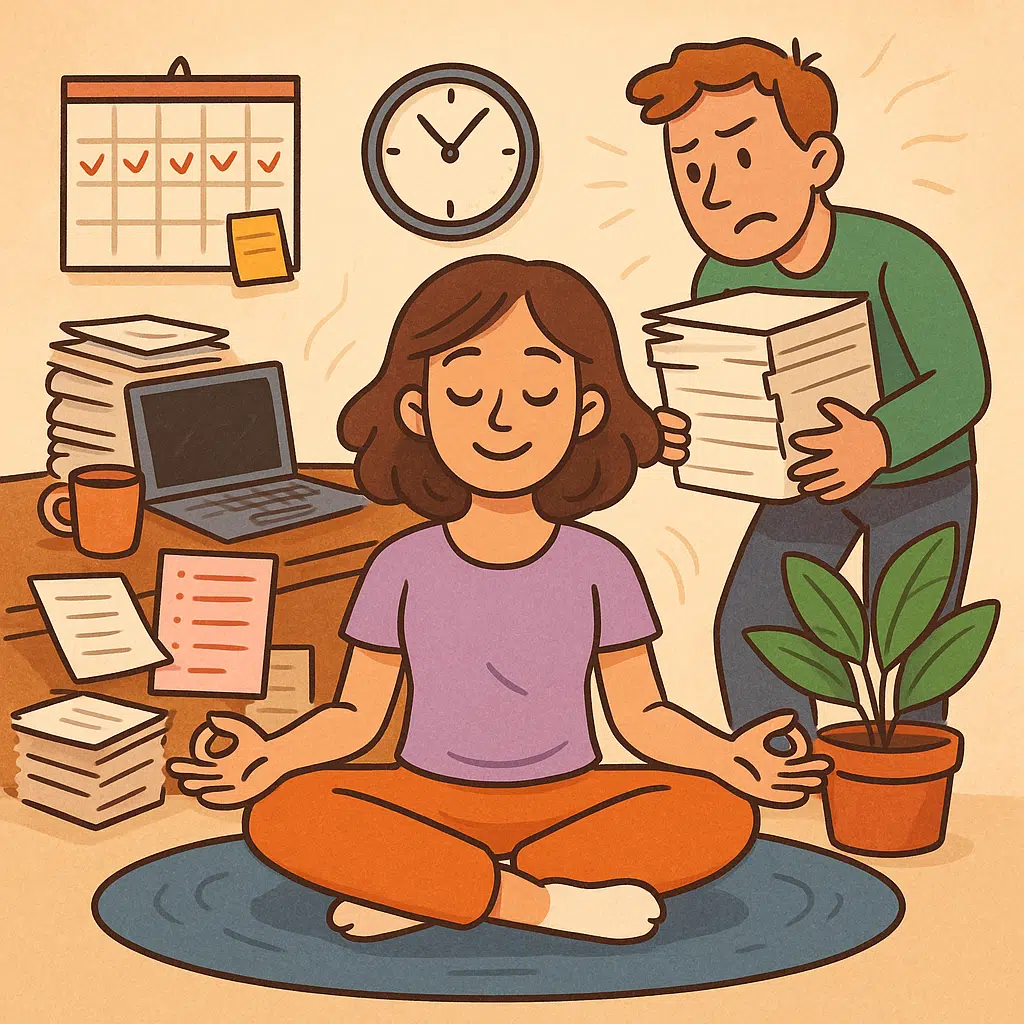The Importance of Taking Time for Yourself During Busy Times
Charlotte Stone August 11, 2025
Let’s be real: life’s busy. You’re juggling tasks like a circus performer—work deadlines, family, your inner calling to just rest and not feel guilty about it. Yet here’s the truth: taking time for yourself during busy times isn’t indulgence—it’s survival. And in fact, the trend in 2025 is crystal clear: self-care isn’t optional; it’s non-negotiable.

I’m talking hard facts backed by research, sprinkled with real tips (and a dash of Gen Z sass). So, grab your tea, rest those tired typing fingers, and let’s get into why caring for you is the smartest productivity hack out there.
Why Prioritizing “Me Time” Is a Game Changer
1. It Shields Against Burnout
Right now, we’re seeing burnout on epic levels—like 82% of Australian workers feeling completely exhausted, according to a report just published in The Daily Telegraph this week. That’s not stress—that’s the whole factory crashing down.
Experts say the antidote lies in strategic breaks: setting boundaries, practicing mindfulness, batching tasks—but especially making time for yourself during busy times.
2. Rest = Resilience (Not Laziness)
Ever feel guilty for just lying still? You’re not alone. A Time article highlighted how many of us would rather suffer through slow torture than do nothing—because relaxin’ is seen as unproductive. But here’s the thing: regular rest is life insurance. It helps us rebound quicker when stress hits.
3. Creativity and Clarity Get a Boost
When you intentionally slow down, something magical happens—perspective and innovation creep in. Financial Times just published a piece on the transformational power of real, forced rest—like post-surgery downtime—where author Camilla Cavendish discovered her creativity and empathy soared once she stopped chasing productivity and simply was present.
4. Mindfulness Isn’t Just Buzz—It Works
Whether via apps, breathwork, or five-second hand-washing awareness, mindfulness delivers real results. Studies show mindfulness reduces anxiety, lifts mood, improves focus, and boosts stress resilience. And even ultra-short practices count: Glamour recommends 30-second mindful pauses throughout your day to reset.
5. Self-Care Powered by Self-Compassion = Win
Emerging research in Nature shows that when we act with self-compassion, it fuels self-care—and protects against burnout while strengthening engagement at work. It’s the holy combo: love yourself, then treat yourself.
The Trend in 2025: Me Time Is Not Selfish
- A recent IHG study in Australia reveals a growing demand for solo escapes—millennials leading the charge with curated one-night “NOMO” retreats to recharge, not splurge.
- Workplaces are waking up, too. Reports show organizations investing in employee wellbeing—mindfulness programs, flexible scheduling, health initiatives—can boost productivity by up to 20% and cut absenteeism.
A Faith-Based Boost: Sabbath Rest Isn’t Just Tradition
As someone who values my walk with God, let’s not ignore what the Bible says: God modeled rest (Genesis 2:2–3), commanded Sabbath (Mark 2:27)—and promised renewal. Taking purposeful rest isn’t passive—it’s an invitation to remember He’s got it all under control. Your downtime can be a whispered prayer, a moment to reflect, or simply a peaceful pause. It’s profound. It’s spiritual health.
How to Actually Make Time for Yourself (Without Guilt)
Here’s the actionable part—practical, faith-intersected tips you can use today to prioritize yourself without guilt.
A. Guard Non-Negotiable Personal Time
Treat “me time” like a critical meeting. Block 5–30 minutes in your calendar and stick to it. Verywell Mind highlights scheduled downtime as essential for preventing burnout. Communicate this boundary to others and treat it as sacred.
B. Micro-Practices That Add Up
No time for a long break? Try micro-practices: a few deep breaths, a quick step outside, or mindful hand-washing. These 1–3 minute resets, backed by the American Psychological Association, reduce stress and boost focus.
C. Set Boundaries Like a Pro
Saying “no” is saying “yes” to your wellness. Before committing, ask: Does this honor my body, mind, and spirit? If not, decline kindly. Harvard Business Review notes boundaries create freedom and reduce stress.
D. Turn Breaks into Spiritual Moments
Rest isn’t just unplugging—it’s connecting with yourself and your Creator. Pray, reflect on scripture (e.g., Psalm 46:10), or journal briefly. These moments make rest sacred, easing guilt.
E. Lean on Tools, People, and Ritual
Use mindfulness apps (e.g., Calm or Abide), set break reminders, or join workplace wellness programs like “Booster Breaks.” Create rituals like a gratitude prayer or a NOMO-style mini-retreat to make self-care intentional.
Why This Matters for Your Career (and Your Sanity)
Better decisions. Rest sharpens your mind, making decisions clearer and more confident. Fatigue leads to impulsive choices, while a rested brain weighs options with precision, reducing risks in work and life.
Resilience quotient rises. Employers prize employees who recover from setbacks. Rest builds the grit to handle stress, adapt to challenges, and stay steady under pressure.
Sustainable productivity. Hustle culture glorifies overwork, but rest fuels consistent, high-quality output. A sustainable rhythm prevents burnout and drives long-term success.
Sharper spiritual alignment. Rest aligns your well-being with your faith, fostering peace and purpose. This clarity enhances both your work performance and spiritual life.
Summary Table: Why Taking Time for Yourself During Busy Times Pays Off
| Benefit | What You Get |
|---|---|
| Burnout Prevention | Physical, mental, and spiritual resilience |
| Creativity & Clarity | Fresh perspective and innovation |
| Improved Focus & Mood | Stress reduction, emotional balance |
| Spiritual Recharge | Echoes God’s rhythm of work, rest, and worship |
| Workplace Impact | Higher productivity, lower absenteeism, boosted morale |
Final Word
Hey, boss—you’re allowed to hit pause. Research, life trends, and even scripture back it up: taking a break isn’t just nice, it’s essential. Studies show rest boosts focus and empathy, while burnout’s real when you don’t stop. Scripture’s got the Sabbath for a reason—rest is holy. “Taking time for yourself during busy times” isn’t a cliché; it’s a must. Schedule it, protect it, use it—whether it’s a walk or a nap. You’ll come back sharper, kinder, and ready for what’s next. In a caring Creator’s hands, that rest sets you up to thrive.
References
- Harvard Health Publishing. (2021). The importance of self-care during stressful times. Harvard Medical School. https://www.health.harvard.edu
- American Psychological Association. (2022). Why taking time for yourself is vital for mental health. https://www.apa.org
- Mayo Clinic Staff. (2023). Self-care: Taking charge of your health. Mayo Clinic. https://www.mayoclinic.org







